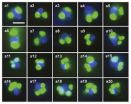War, plague no match for deforestation in driving CO2 buildup
2011-01-21
(Press-News.org) Stanford, CA— Genghis Khan and his Mongol hordes had an impact on the global carbon cycle as big as today's annual demand for gasoline. The Black Death, on the other hand, came and went too quickly for it to cause much of a blip in the global carbon budget. Dwarfing both of these events, however, has been the historical trend towards increasing deforestation, which over centuries has released vast amounts of carbon dioxide into the atmosphere, as crop and pasture lands expanded to feed growing human populations. Even Genghis Kahn couldn't stop it for long.
"It's a common misconception that the human impact on climate began with the large-scale burning of coal and oil in the industrial era," says Julia Pongratz of the Carnegie Institution's Department of Global Ecology, lead author of a new study on the impact of historical events on global climate published in the January 20, 2011, online issue of The Holocene. "Actually, humans started to influence the environment thousands of years ago by changing the vegetation cover of the Earth's landscapes when we cleared forests for agriculture."
Clearing forests releases carbon dioxide into the atmosphere when the trees and other vegetation are burned or when they decay. The rise in atmospheric carbon dioxide resulting from deforestation is recognizable in ice cores from Greenland and Antarctica before the fossil-fuel era.
But human history has had its ups and downs. During high-mortality events, such as wars and plagues, large areas of croplands and pastures have been abandoned and forests have re-grown, absorbing carbon dioxide from the atmosphere.
Pongratz decided to see how much effect these events could have had on the overall trend of rising carbon dioxide levels. Working with colleagues at the Max Planck Institute for Meteorology in Germany and with global ecologist Ken Caldeira at Carnegie, she compiled a detailed reconstruction of global land cover over the time period from 800 AD to present and used a global climate-carbon cycle model to track the impact of land use changes on global climate. Pongratz was particularly interested in four major events in which large regions were depopulated: the Mongol invasions in Asia (1200-1380), the Black Death in Europe (1347-1400), the conquest of the Americas (1519-1700), and the Fall of the Ming Dynasty in China (1600-1650).
"We found that during the short events such as the Black Death and the Ming Dynasty collapse, the forest re-growth wasn't enough to overcome the emissions from decaying material in the soil," says Pongratz. "But during the longer-lasting ones like the Mongol invasion and the conquest of the Americas there was enough time for the forests to re-grow and absorb significant amounts of carbon."
The global impact of forest re-growth in even the long-lasting events was diminished by the continued clearing of forests elsewhere in the world. But in the case of the Mongol invasions, which had the biggest impact of the four events studied, re-growth on depopulated lands stockpiled nearly 700 million tons of carbon absorbed from the atmosphere. This is equivalent to the world's total annual demand for gasoline today.
Pongratz points out the relevance of the study to current climate issues. "Today about a quarter of the net primary production on the Earth's land surface is used by humans in some way, mostly through agriculture," she says. "So there is a large potential for our land-use choices to alter the global carbon cycle. In the past we have had a substantial impact on global climate and the carbon cycle, but it was all unintentional. Based on the knowledge we have gained from the past, we are now in a position to make land-use decisions that will diminish our impact on climate and the carbon cycle. We cannot ignore the knowledge we have gained."
###
The Carnegie Institution for Science (carnegiescience.edu) is a private, nonprofit organization headquartered in Washington, D.C., with six research departments throughout the U.S. Since its founding in 1902, the Carnegie Institution has been a pioneering force in basic scientific research. Carnegie scientists are leaders in plant biology, developmental biology, astronomy, materials science, global ecology, and Earth and planetary science.
The Department of Global Ecology was established in 2002 to help build the scientific foundations for a sustainable future. The department is located on the campus of Stanford University but is an independent research organization funded by the Carnegie Institution. Its scientists conduct basic research on a wide range of large-scale environmental issues, including climate change, ocean acidification, biological invasions, and changes in biodiversity.
END
ELSE PRESS RELEASES FROM THIS DATE:
2011-01-21
WASHINGTON, Jan. 20 – The eyes of moths, which allow them to see well at night, are also covered with a water-repellent, antireflective coating that makes their eyes among the least reflective surfaces in nature and helps them hide from predators in the dark. Mimicking the moth eye's microstructure, a team of researchers in Japan has created a new film, suitable for mass-production, for covering solar cells that can cut down on the amount of reflected light and help capture more power from the sun.
In a paper appearing in Energy Express (www.OpticsInfoBase.org/ee), a ...
2011-01-21
VIDEO:
A two-minute video, "Morphological Change in Machines Accelerates the Evolution of Robust Behavior, " was produced by the Morphology, Evolution and Cognition Laboratory, University of Vermont, 2011.
Click here for more information.
Want to build a really tough robot? Forget about Terminator. Instead, watch a tadpole turn into a frog.
Or at least that's not too far off from what University of Vermont roboticist Josh Bongard has discovered, as he reports ...
2011-01-21
AURORA, Colo. (Jan. 20, 2011)--Cancer scientists have designed the first molecular test to predict which bladder cancer patients may have cancer involvement in their lymph nodes at the time of surgery—which could help doctors determine which patients are good candidates for pre-surgical, or neo-adjuvant, chemotherapy.
The test analyzes 20 genes on tumor biopsies, according to a paper published online Jan. 20, 2011, in Lancet Oncology.
"Randomized clinical trials have shown that giving neo-adjuvant chemotherapy extends patient lives, but only 5 to 15 percent of patients ...
2011-01-21
In a paper published today in the journal Science, a University of California, Davis, researcher and his co-authors challenge a widely held assumption that plants will move uphill in response to warmer temperatures.
Between 1930 and 2000, instead of colonizing higher elevations to maintain a constant temperature, many California plant species instead moved downhill an average of 260 feet, said Jonathan Greenberg, an assistant project scientist at the UC Davis Center for Spatial Technologies and Remote Sensing.
"While the climate warmed significantly in this period, ...
2011-01-21
With little more than a conventional photocopier and transparency film, anyone can build a functional microfluidic chip.
A local Cambridge high school physics teacher invented the process; now, thanks to a new undergraduate teaching lab at Harvard's School of Engineering and Applied Sciences (SEAS), students will be able explore microfluidics and its applications.
The Microfluidics Lab, developed by Dr. Anas Chalah, Director of Instructional Technology at SEAS, takes advantage of a simple but ingenious new method of creating lab-on-a-chip devices that are quick to produce, ...
2011-01-21
DETROIT—Wayne State University researchers have found that when patients and providers speak the same language, patients report less confusion and better health care quality. The findings were based on data from the Pew Hispanic Center/Robert Wood Johnson Foundation's Latino Health Survey.
Understanding the relationship between language and health care quality has important public health implications for providing services in an increasingly diverse U.S. population, according to Hector M. González, Ph.D., assistant professor of family medicine and public health at WSU's ...
2011-01-21
Breast cancer patients who have a strong social support system in the first year after diagnosis are less likely to die or have a recurrence of cancer, according to new research from Vanderbilt-Ingram Cancer Center (VICC) and the Shanghai Institute of Preventive Medicine. The study, led by first author Meira Epplein, Ph.D., assistant professor of Medicine at VICC, was published in a recent edition of the Journal of Clinical Oncology.
Patients in the study were enrolled in the Shanghai Breast Cancer Survivor Study, a large, population-based review of female breast cancer ...
2011-01-21
A team of biologists has discovered an entirely new group of algae living in a variety of marine and freshwater environments. This group of algae, which the researchers dubbed "rappemonads," have DNA that is distinctly different from that of other known algae. In fact, humans and mushrooms are more closely related to each other than rappemonads are to some other common algae (such as green algae). Based on their DNA analysis, the researchers believe that they have discovered not just a new species or genus, but a potentially large and novel group of microorganisms.
The ...
2011-01-21
New research reveals that a hormone best known for stimulating the production of red blood cells can modulate the immune response. The study, published by Cell Press in the January 27th issue of the journal Immunity, finds that erythropoietin (EPO) has contrasting influences on infectious and inflammatory diseases and may be useful in the design of new therapeutic strategies.
EPO is a cytokine hormone that stimulates the production of red blood cells by acting at EPO receptors (EPORs) on red blood cell precursors. Interestingly, other cell types also express EPORs. ...
2011-01-21
LOUISVILLE, Ky. – Healthcare workers can most directly affect quality of life (QOL) of patients with advanced stage lung cancer by helping manage symptoms such as pain, lack of energy, shortness of breath, coughing, difficulty sleeping and dry mouth, according to a study recently published in the journal Oncology Nursing Forum.
Understanding the symptoms, particularly symptom distress - or the degree to which a symptom bothers a person, is crucial to improved patient care. Intervention at the time of diagnosis is important because patients with stage IIIb or IV lung cancer ...
LAST 30 PRESS RELEASES:
[Press-News.org] War, plague no match for deforestation in driving CO2 buildup



